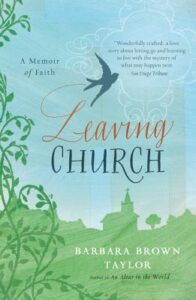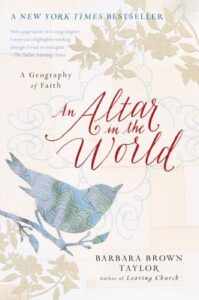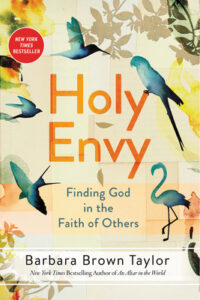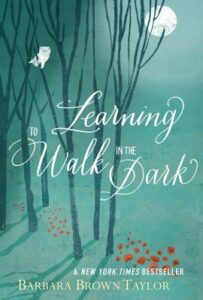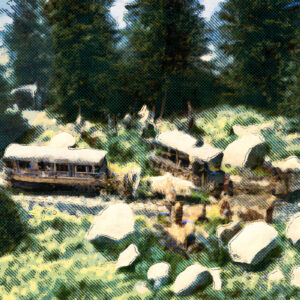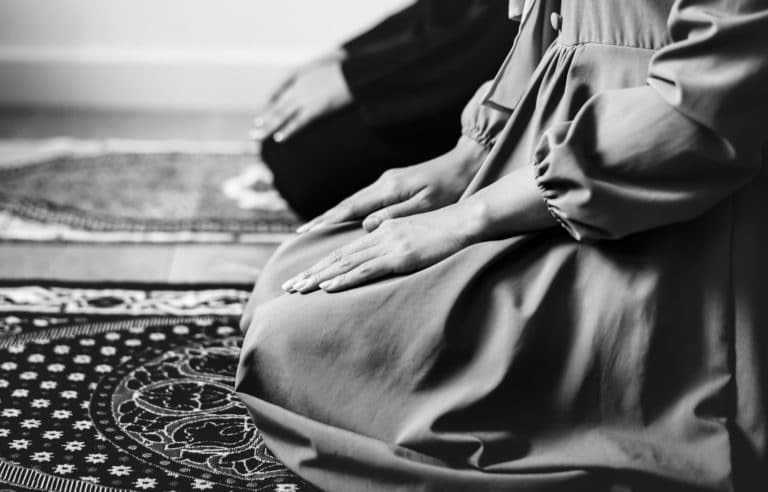Barbara Brown Taylor
“This Hunger for Holiness”
“I like it much better than ‘religious’ or ‘spiritual’ — to be a seeker after the sacred or the holy, which ends up for me being the really real.”
– Rev. Barbara Brown Taylor
From Krista, about this week’s show:
It’s fascinating to trace the arc of spiritual searching and religious belonging in my lifetime. The Episcopal priest and public theologian Barbara Brown Taylor was one of the people I started learning about when I left diplomacy to study theology in the early 1990s. At that time, she was leading a small church in Georgia. And she preached the most extraordinary sermons, and turned them into books read far and wide. Then in 2006, she wrote Leaving Church — about her decision to leave her life of congregational ministry, finding other ways to stay, as she’s written, “alive and alert to the holy communion of the human condition, which takes place on more altars than anyone can count.”
She’s written other books since, with titles like An Altar in the World, Learning to Walk in the Dark, and Holy Envy: Finding God in the Faith of Others. Being in the presence of Barbara Brown Taylor’s wonderfully wise and meandering mind and spirit, after all these years of knowing her voice in the world, is a true joy. I might even use a religious word — it feels like a “blessing.” And this is not a conversation about the decline of church or about more and more people being “spiritual but not religious.” We both agree that this often-repeated phrase is not an adequate way of seeing the human hunger for holiness. This is as alive as it has ever been in our time — even if it is shape-shifting in ways my Southern Baptist and Barbara’s Catholic and Methodist forebears could never have imagined.

Image by Lilian Vo, © All Rights Reserved.
Guest
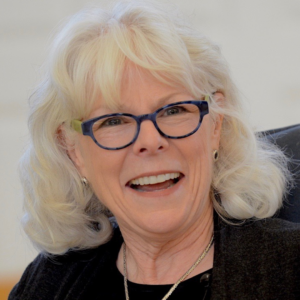
Barbara Brown Taylor is the author of many books, including An Altar in the World, Leaving Church, Holy Envy, and Learning to Walk in the Dark. Her 2020 book is Always a Guest, a compilation of recent sermons. She is the former rector of Grace-Calvary Episcopal Church of Clarkesville, Georgia, and she taught for two decades in the religion department at Piedmont College. Image by Jean Santopatre.
Transcript
Transcription by Alletta Cooper
Krista Tippett: It’s fascinating to trace the arc of spiritual searching and religious belonging in my lifetime — and in the work I’ve done very intently since the turn of this momentous century. The Episcopal priest and public theologian Barbara Brown Taylor was one of the people I started learning about when I left diplomacy to study theology in the early 1990s. At that time, she was leading a small church in Georgia. And she preached the most extraordinary sermons and turned them into books read far and wide. Then in 2006, she wrote Leaving Church — about her decision to leave her life of congregational ministry, finding other ways to stay, as she’s written, “alive and alert to the holy communion of the human condition, which takes place on more altars than anyone can count.” She’s written other books since — with titles like An Altar in the World, Learning to Walk in the Dark, and Holy Envy: Finding God in the Faith of Others. Being in the presence of Barbara Brown Taylor’s wonderfully wise and meandering mind and spirit, after all these years of knowing her voice in the world, is a true joy — I might even use a religious word — it feels like a “blessing.” And it’s not a conversation about the decline of church or about more and more people being “spiritual but not religious.” We both agree that this often-repeated phrase is not an adequate way of seeing the human hunger for holiness. This is as alive as it has ever been in our time — even if it is shape-shifting in ways my Southern Baptist and Barbara’s Catholic and Methodist forebears could never have imagined.
I’m Krista Tippett, and this is On Being.
[music: “Seven League Boots” by Zoë Keating]
Barbara Brown Taylor came of age in an earlier era of shifting religiosity. Her parents encouraged her to go to the library instead of to church. And Time Magazine was asking on its cover whether God was dead — and she studied at Emory University as one of its theologians helped make that case. I was in the On Being studios and she traveled to Georgia Public Broadcasting to speak with me.
Tippett: Hello?
Barbara Brown Taylor: Hello.
Tippett: Hi, it’s Krista.
Taylor: Krista Tippett, it’s Barbara Taylor.
Tippett: I’m so glad to meet you. You know, I thought all these years that our paths would actually cross with bodies on and they never have. [laughter] And you know, as I started delving in, I kept seeing this word “peregrination” show up from across the years. I looked it up and it comes from the Latin “to live or travel abroad,” but it’s really a meandering journey, which felt like good framing for your life and faith and callings, and also the evolution of religion and religiosity and God in the course of your lifetime and mine, and especially in this century, which is also something I want to draw you out on.
So, literally, you had a peregrinating — there was a lot of peregrination in your childhood. It looks like you moved nine times before you were in ninth grade.
Taylor: That’s true.
Tippett: A lot of moving around. And then, in terms of the religious background of the world you grew up in, God was officially dying.
Taylor: Um-hm.
Tippett: But interestingly, it seems that you were not deterred or frightened by God’s death. You kept investigating church. How do you think about what you were looking for, what you were searching for?
Taylor: Oh, there’s so many answers because in high school, I was looking for friends and all my friends went to churches and wanted me to go with them to churches. So that was the belonging stage. And after that, it was mostly realizing I hadn’t found it yet. So it was mostly a sense that I was being drawn to a place with people I cared about, but what I was looking for wasn’t there. So what was I looking for? Some sense that I was being told the truth about the way things really were. And instead, I think I often found caricatures or warnings about the way things were. Especially as a young person, a lot of people lobbying for my soul, both denominationally and theologically.
So it took me until my middle year of seminary to walk into a church in downtown New Haven and feel like I was home. Though now when I look back on it, it was like Hogwarts. I mean, I can’t believe that’s what I fell in love with, but I did.
Tippett: You mean that church, that high Episcopal Church?
Taylor: Yeah. Very high. I think no women even in the choir.
Tippett: Yeah. Lots of — what do they say? “Bells and smells” and all of that, all the high ritual. I love this story about — it sounds like, again, you were on this wandering exploration and you went to many kinds of churches and then the story about when you landed in this Episcopal Church in your mid-20s and the priest who said to you when you went to talk to him about this, he said, “Deary, you are an ecclesiastical harlot. Let’s be sure you’re really in love this time.” [laughter]
Taylor: Yes, no, he has passed onto his blessed rest. I hope that he knows I did — I stayed faithful in my way.
Tippett: Yeah. You were in love and you were eventually ordained a priest. And your book Leaving Church is one that a lot of people read. And I like the structure of that book, which is in three parts: “Finding,” “Losing,” and “Keeping,” which also feels like a good framing for this journey, not just that you’ve been on, but that we’re on as a culture. One of the things that intrigued me that you wrote about leaving parish ministry in 1997 — then you became a college religion teacher. I want you to unfurl this for me. You said that moving from church to classroom was “the beginning of my theological humiliation.” [laughs] What does that mean?
Taylor: Well, it was a surprising move. You got it right, though. I’m really happy you understood “leaving church” meant leaving parish ministry because I got many consolation notes shortly after that offering to help me find my way back to God. And I said, “Nope, don’t need help with that. Just needed a vocational change.” But what it meant was leaving a church where I was solo pastor — I had special vestments I put on. I had a time when I got to talk and nobody else talked. I had a parking spot. But to move into a college situation where there was not even a religion department, but that came under the Department of Humanities meant that literally, I walked to the door of my new office and it said “Barbara Taylor, Department of Humanities.” And I thought that is such a long ways from being a “Master of Divinity”…
Tippett: “Master of Divinity,” right. [laughter]
Taylor: …with some miles on the odometer. And I had a lectern instead of an altar. And the most distressing thing was to find my language didn’t work anymore. The plural “we”: we believe, we’re called, we are here because we’ve come to baptize this child. All my language was gone. So it was a great time in my life to reinvent, though I’m very happy students didn’t know that I didn’t know what I was doing.
Tippett: One of the things you wrote about teaching, something that came to you, you said, “the great gift” — and you pointed at this a minute ago — “the great gift of the unbelievers in class.” Well, a couple of things. You said, “the students in my [classes] who distanced themselves from religion often knew more about the faith they had left behind than the students who stayed put without question.” And then you said, “the great gift of the unbelievers in class was to send me back to my historic vocabulary list to explore its meaning in the present.” That you now had to translate, as you say, things that were said ritually.
What this makes me think of is something that’s been on my mind in the last couple of years — which is not what you were talking about then, but bringing that into the present — I am having this experience that theological and liturgical language and practices, at the same time that we can tell a story of churches emptying out, that theological and liturgical language and practices feel more resonant for the world we inhabit than ever before. And I’m thinking of confession and repentance and lamentation and redemption.
And also, I feel like what I see from where I sit in terms of all the energies and curiosity around this part of life — this religious and spiritual part of life, this life of faith — is so much more complicated and richer than the phrase “spiritual but not religious.”
Taylor: Yeah, I’ve been offended by the category of the nones, N-O-N-E-S, because it sounds like a null set. I don’t know if this is what you’re talking about, but the whole way for many years that people who were embedded in church communities dismissed the spiritual but not religious was being frivolous, non-committed individualists who just wanted to design their own religion. And now, lo-and-behold, it turns out they’re really part of an evolution we’re in the middle of. And I hope we find a word better than “Nones” to describe them, not only because they’re now 30% of the US population.
Tippett: Yeah, N-O-N-E-S.
Taylor: Yeah.
Tippett: Well, part of the reason that word is destined not to be profound is because it emerged from a poll. The context in which it was formulated is lacking.
Taylor: And “unaffiliated” is not very lovely, is it? We’ll have to find something else. “The peregrinaters”? “The peregrines.”
Tippett: Yeah. Is that the category you’d like to recommend?
Taylor: I don’t know. I think they’ll think of their own names and I hope there’ll be a lot of them, a lot of different ones. Because again, the N-O-N-E-S is a category that includes a bunch of people who are very different from one another as well.
Tippett: Yeah, yeah. In the beginning of the section of Leaving Church, you have a quote from Teilhard de Chardin, which I really loved: “What we are all more or less lacking at this moment is a new definition of holiness.” And it almost felt to me like that’s a better descriptor of the search that is on. I don’t know, where does that language of “a new definition of holiness” take your theological imagination right now?
Taylor: It takes me in so many directions. I realize as we speak, I’m thinking of things like my age and the region in which I live, and the ways in which holiness is used. Where I live, it’s most often in terms of Pentecostal Holiness churches. So that would be the free association for that. And yet, the hunger for holiness in terms of a sense of being rooted — grounded in shifting ground — which oddly means that to be, what, to be holy is to keep one’s balance while the earth moves under our feet.
There’s a lot. I would love to play with that word for the whole rest of our time, but I like it much better than “religious” or “spiritual,” but to be a seeker after the sacred or the holy, which ends up for me being the really real. But not just the materialist really real, but the really real that’s got layers all the way down.
[music: “The Gerimo” by Blue Dot Sessions]
Tippett: I’d love to walk through — as I was reading through your work and your writing and interviews you’ve done across the years, also just finding what you had written about going from the church to the classroom, or sending you back to the “historic vocabulary” for its “meaning in the present.” And, of course, that present you were talking about in the 1990s was different from ours. And one of the pieces of theology that you invoke again and again is this notion of incarnation, a spirituality and a theology that — a spirituality that is embodied. In your book, An Altar in the World, you titled the chapter about incarnation, “The Practice of Wearing Skin.”
You’ve talked about “the daily practice of incarnation — of being in the body with full confidence that God speaks the language of flesh.”
Taylor: That’s what came up quickly and clearly for me, was no longer standing up to speak in a community that shared a language and spoke it with some coherence back and forth, also some lively variation and what they meant by all those multisyllabic theological words. But then, all of a sudden, to be in a college classroom with students of many faiths and no faiths to whom it meant little, next to nothing. When I compare the teaching of World Religions, which was full of practices, dance and music, and body decoration and mandalas, and going from that to Intro to Christian Theology, it was like going from a festival to a cemetery, in terms of where the body just vanished. It all went up into the head to figure out whether our ontology fit with our eschatology and whether our doxologies were adequate. It was a big challenge for me to either stop using the language or find a way to put skin and flesh on the language. And I’ve kept that through the years. I’m a champion of body language when speaking of the holy, which for some people is counterintuitive, because they’ve been taught the body has nothing to do with what is holy. But I beg to differ.
Tippett: Yes, you wrote about the Christian reverence for the body: “the neighbor’s body, the leper’s body, the orphan’s body, the Christ’s body — the clear charge to care for the incarnate soul.”
Taylor: And these days, more and more for the body of the tree and the body of the mountain and the body of the river. And I think — and that train pulled through the station a long time ago with people like Sallie McFague at Vanderbilt, lots of people who did ecological work that now has a new fire under it: that if we don’t take the body of this earth seriously, it will no longer be our host.
Tippett: Yeah. It’s also that what we have referred to as “body” and what we’ve referred to as emotion and spirit, that those things in fact are completely entangled. We know this now in a way we didn’t even know this 20 years ago.
Taylor: It’s true. I just listened — this will be highly inappropriate. You can take it out, too — but I just listened to Lady Gaga sing at the Academy Awards, and that woman sings from the top of her head to the soles of her feet. And as soon as she started belting out that song, I had this rush, this physical rush that went head to foot. And I think it was awe. I don’t know what that was. It was certainly amazement at the full embodiment of her purpose in community at that moment. So there. The Academy Awards just made it into our talk.
Tippett: [laughs] Excellent. I also just love this language: you said, “Here we sit, with our souls tucked away in this marvelous luggage, mostly insensible to the ways in which every spiritual practice begins with the body. Our bodies have shaped our views of the world, just as the world has shaped our views of our bodies.” You’ve been thinking about that for a long time. And again, science is meeting it now.
Taylor: Oh, thank you. That made me sound ahead of the time. [laughter] I don’t think I was. I’ve always felt way behind. You live long enough, the circle comes around again.
Tippett: Yeah, there you go.
Taylor: When we talk about theological language, I was mid-20s when I discovered it, largely in seminary. And then it was the most wonderful thing I had ever discovered. It was like a field guide and somebody had given me a book with the names of things that I had experienced, but I didn’t know there were these names for them. And so it was a gift of language along with a community that spoke the language. And so it was a kind of taxonomy of holiness. Late in life, that same language often feels to me like a seatbelt, like it’s trying to keep me in a car. I want to get out of the car; I want to get my feet on the ground. But the language keeps saying, “No, no, no, here are the boundaries of the taxonomy.”
I just want to start all of a sudden now saying, “Look: bird with white spots on it and some red,” instead of going to my field guide to see what the bird’s name is, how long its wings are, what it weighs, where its migration patterns are. So I guess in other contexts, I’ve talked about the rewilding that happens after a while.
Tippett: Yeah. I want to talk about wilderness. I definitely want to get there. What comes to mind if you think about that taxonomy that you learned that was a gift? And I also had that experience studying theology. It was like this — there were these riches that had been hidden away, even though I went to church three times a week.
Taylor: Yeah, and as you spoke about it earlier about the appropriateness of the language for a lot that is going on now in the headlines, if not in churches. But where I live, the language is either — the language is required or it’s rejected. The language, even if it fits right now with a lot of people I’m in community with, will not be used because of the abuse associated with it in the past. Even some of the good language, you know? If we want to talk about good language and bad language, or frightening language and “redemptive” language, to put one of the words in there. But I really — I spent a lot of time with people who don’t want anything that sounds like the church they were hurt in.
Tippett: One of the things, when you talk about incarnation and the body, you said, “Deep suffering makes theologians of us all.” And you said, “The questions people ask about God in Sunday school rarely compare with the questions we ask while we are in the hospital. This goes for those stuck in the waiting room as well as those in [the hospital] beds.”
Taylor: Yes. [laughs] Yeah. I was never good at hospital calls. Because I was pretty sure I knew why I was there, but it meant offering to pray preferably from The Book of Common Prayer. And that never seemed to me like what was called for once I was in the room. And quite often, if I would sit there quiet long enough — I don’t mean to be a bummer here, but what people would get around to saying is how odd it was that they did not feel the presence of God. That in their hardest hours they felt abandoned. And that called for a different kind of prayer.
But again, that was probably the point at which my theological training required me to learn how to be an improvisational holy person. And that called for as much creativity as I could come up with, but mostly not many words. Whatever that says about the theological language. Nope. It was better to rub someone’s feet or just sit and breathe together. But then, I always wondered if I was doing my job.
Tippett: You’ve written so interestingly about prayer. You had a chapter on prayer in Altar in the World, and I noted that in the first few pages you said, you wrote these different things: “I know that a chapter on prayer belongs in this book, but I dread writing it,” and “I am a failure at prayer,” and “I would rather show someone my checkbook stubs than talk about my prayer life.” [laughter]
Taylor: I’m not a good role model, Krista, but I’m representative. [laughter]
Tippett: Somewhere though — and this was more positive — I think you said, “Sometimes, when people ask me about my prayer life, I describe hanging laundry on the line.”
Taylor: Or all kinds of things. Hanging laundry on the line, like they’re prayer flags and thinking of the people whose laundry it is, and being grateful to the wind for blowing it around. And then, going from that to filling a horse trough with water so that these great big vegetarians can get something to drink during their days. But thank goodness for people like Brother Lawrence in Christian religious tradition, or others who found their vocations in kitchens and sweeping.
Tippett: Brother Lawrence. The Practice of the Presence of God, which, I think — washing dishes. [laughter]
Taylor: Yeah. Oh, he said it was enough to flip a pancake for the love of God because he cooked for his monks. I think he always was a Brother and never went above being a lay Brother. But thank goodness for him and others like him who at least carved out a wedge in the Christian pie for those who did the most ordinary things in the world with reverence, or at least with some awareness that reverence was possible in the most ordinary things on earth. That’s where I live.
Tippett: And I think that language, also that word “reverence,” which is sometimes connected to the notion of sacrament, that does feel like language to me. Especially the word “reverence” that is inviting, even to a modern secular mind that feels like a word and a thing we might be missing.
Taylor: I think you’re right. It’s an attractive word, like “holy.” Those two are not in the rejection pile that I talked about earlier. The catch with reverence is — I think I am also in this category — is we want reverence that brings us into the presence of something greater than ourselves, which is the bottom-line definition. These days when people tell me they don’t believe in a higher power, it occurs to me weather is a higher power. And that there are many things around us beyond our control that are greater than we are. But I think reverence is attractive, particularly to people who want that to be a beautiful awe, a beautiful reverence.
And frankly, what we were talking about a moment ago — a hospital room — will bring you into the presence of something greater than you are. You may not feel reverence in that moment. But so many of the experiences that have increased my reverence have been ones that reminded me how small and temporary and woundable I and all my fellows are.
[music: “Topslides” by Blue Dot Sessions]
Tippett: So the notion of wilderness feels really important to you, and it feels to me that it’s become more and more important to you. In Altar in the World, you’ve called it “The Practice of Getting Lost.” But I saw this talk you gave at the Evolving Faith Conference in 2019. We talked a minute ago about this inadequate description of a lot of people as nones, N-O-N-E-S, defining people by what they don’t have, even kind of connoting nothingness. But for example, Evolving Faith, there’s this deconstruction movement that is post-Evangelical, people around the edges of the tradition and of different denominations. And Evolving Faith is such an interesting group. And I interviewed Jeff Chu for On Being. I think it was a year or so ago. And Rachel Held Evans was part of that movement, conference.
So here you are — what would this be, 20 years on from leaving parish ministry — yourself as an Episcopal priest and in a very different way. And yet stepping outside, stepping beyond the established boundaries of the tradition, even as what was within those boundaries remained so defining for you. And so you’re talking to these largely younger people and it is such a mix of post-Evangelical or people who are still trying to keep one leg in a tradition, or have been raised with not very much and know this — I love that phrase you used a little while — this “hunger for holiness.” And you ended up talking to them about wilderness. So maybe just take me back to thinking about the conference you were going to, and the title “Evolving Faith,” and how the notion of wilderness becomes central for you in that context.
Taylor: At that conference, you’re assigned your topic. So Sarah Bessey said, “Your topic is evolving faith in the wilderness.” She either pegged me or was inviting me to go back there. But even the way you introduced this conversation earlier, I’d never really put together how many times I moved, how many churches I was in, how many vocations I’ve had. But there is a way in which I have sought edges. They aren’t always wilderness, but I have sought the edges of things partly because I came into the church from the edge. So I never was central to it. And, by being ordained, went to the center.
But I think in some ways when I look at my life, every time I’ve achieved competency in anything I’ve left that. [laughs] I’ve gone to do something I didn’t know how to do. And I don’t know what that’s about. Either the pressure of the competence — or the expectation of it — became too heavy, or my brain was going to sleep and just doing what it knew to do to get acclimation. And it was time to go do something new again so I could be a beginner again.
That’s not as far from wilderness as it maybe sounds. But talking to you, I realize wilderness is for the most part a comfortable place for me, as long as I still got a box of raisins, and as long as I can see the stars, as long as water is within a day away. So I live a comfortable life. So it’s careless of me to talk about wilderness when there are people who live in — boy, you talk about an embodied experience — who live in a real wilderness.
But at least theologically, I’ve been happy at the edges and I’ve met people at the edges who are so much more interesting to me than people at the center. Or I’ve discovered by hanging out on the edges how edgy a lot of people at the center are, but don’t think they can talk about it, and don’t think they can let that out. So at least metaphorically, this has been a comfortable place for me.
And it has helped a lot in whatever I’m writing about or talking about to help people I hope feel not so — what? So much like losers for being there. Because some are in the wilderness because they got kicked out, or because they left in a huff or in great pain, or X, Y, or Z. But I appreciated the assignment because it gave me a chance to dig — what was that? Did anyone else hear a bell?
Tippett: No.
Taylor: Okay. I heard a bell. It was… God. Where were we? We were in Evolving Faith with these wonderful people. There were thousands of them there. I was completely floored. It reminded me of a time I was invited to England to the Greenbelt Festival, and I’d always been told England was post-Christian, nothing going on there, until I got to Greenbelt Festival and there were goth masses at midnight. There were 20,000 people at communion on Sunday morning. There was a pub called Jesus’ Arms. So you could tell people you were in Jesus’ arms when you were drinking beer.
Evolving Faith was my American version of that, of just walking into this huge athletic rink and looking at all these people I did not know were a people. And they were a people. So to talk to wilderness with them was just a matter of kind of saying a blessing over the wilderness they felt themselves in.
Tippett: You write and speak really wonderfully about the wilderness in the biblical experience. And I think this becomes another place where these stories have a lot of incredible depth and edge and relevance for precisely 2023. And people aren’t necessarily learning these stories anymore in churches. And maybe they never learned them in this complex way to begin with. But you talk about biblical figures. The wilderness is always there and it’s again and again there in the Bible. It’s also in other kinds of sacred text. You talked about biblical figures who “went in heavy and came out light.” Now, it often has deserts and mountains and clouds.
Taylor: I live in a part of the country — the South is rich in narrative, but also insistent on belief. And so it’s interesting that a lot of those stories never come up. Or when they come up, they are about underlining correct beliefs about things instead of about getting a chill from the unknown in those stories, in the wilderness, in the mountains, in the valleys, in the clouds. So I love, love retelling the stories with an eye to what’s often left out of the stories, because it’s scary, especially if you decide to go and not just to take a big heavy backpack with everything you’ll need. [laughter]
Tippett: That’s how we learn how to do. But I heard you say that you don’t speak about Christ anymore, but you’re very happy to speak about Jesus. I’m thinking about the story of Jesus and the wilderness and how people didn’t understand — the people around him didn’t understand.
Taylor: Didn’t understand what part?
Tippett: Somewhere you wrote he didn’t try to protect anyone from the wilderness. And they fell asleep, kept hoping he would make it go away.
Taylor: And over and over again. It was his M.O. I know everybody makes up their own Jesus in a way, but I just love the way he was disorienting people all the time. They kept asking him to nail a few things down. I wouldn’t even pursue that pun. They just wanted a straightforward answer. And then, he’d tell a story, or he’d ask them a question, or he’d say, “You know the answer to that.” He was just so — he had to be charismatically infuriating. But that’s the Jesus I guess I have loved, is the one who won’t give you a straight answer, but who puts a hand on some part of your body and says, “But I’ll go with you. We can go check it out.”
Tippett: What is this, if wilderness is part of the human condition, what role does it play? What is it there for? Or what does it do in and for us when we encounter it? What have you learned about that?
Taylor: Well, your ego will get a major thump. I think of wilderness as where you get a feel for your true size. It was the main gift of my leaving the city where I lived happily for 25 years to live in the country, where I’ve now lived 30 years. And nothing, where I live now, is human scale. Everything in the city was human scale. Beautiful, fantastic buildings built by people, and parks planned by people. But now I live without a single human-made thing visible off my front porch. So that’s a very comfortable wilderness, but I’m very clear about my size in that scale.
If it is a lost wilderness, one in which I’m lost — whether through illness or newness or travel — I learn how much I need other people. I think of myself as a solitary and yet wilderness is when I’m really desperate for a companion, for someone who knows the way, or at least someone to talk to at night.
What else does wilderness teach? Wilderness — it’s important for me to remember, wilderness stories are only good if you make it out alive. I think often in the stories I was taught about Exodus, it was as if the people who went in were the people who came out. And that’s not so. Generations perished in between.
Tippett: Even Moses didn’t come out.
Taylor: I know, I know. And why don’t we ever hear that?
Tippett: We don’t tell that. Yeah, I know.
Taylor: And that’s especially pertinent to now. I know so many people desperate to make a difference now to turn things around now. And it’s really hard to say, “You know, it’s possible we’re part of a bucket brigade here and you got the bucket from somebody else and you’re going to hand it on. And we’ll only know the middle.” We don’t know. All we know are middles in this.
So it’s important for me also to remember that people perish in the wilderness. They’re not just improved. People perish there. And with any luck, with any legacy, they make it possible for the next generation to go on with some kind of hope/confidence/courage/willingness.
Tippett: For Evolving Faith, you have invited this notion of, this question of what a subsistence spirituality might look like. A spirituality “lean enough to live in the wilderness as long as necessary.” I find that such an intriguing notion: a lean spirituality, a subsistence spirituality. Say some more about that.
Taylor: Well, if you go in there with a fatter one than that, it will lose weight pretty quickly. And if you’ve got ideas about special protection, special license, special whatever, I think those get corrected. So I’m interested in — by subsistence spirituality, I think I mean one that can find some way to open its arms to what’s happening instead of insisting that it shouldn’t be happening. And then, I don’t know, lean rations. I think another saying in the scriptures I love that never gets enough play is when Jesus blesses the poor in spirit. And yet I’ve never heard a sermon encouraging me to take on more spiritual poverty. [laughter] But I think there’s something in this subsistence spirituality idea about what it means to be poor in spirit. And I’m not even sure what that means, but he seemed to think it was —
Tippett: What does that mean? I have puzzled over that. What does that mean?
Taylor: All I can figure is that in whatever congregation I am imagining, or he imagined, there were some spiritual fat cats hanging around, kind of flaunting their goods. And that there were some people sitting a few rows behind them who said, “I am so inadequate. I am such a loser.” And there was some kind of bread being offered them, to not compare themselves to those who seemed rich in spirit. That was Matthew’s gospel, not Luke’s. So, I’m not sure he was thinking about money at that point. But there certainly is — I know a lot of people who believe they’re spiritually rich, and God bless them — but I really prefer the company of those poor in spirit. They’re my pals and they have really bad mouths on them, and I just love them for it.
[laughter]
[music: “Arrival at Kirknes” by Blue Dot Sessions]
Tippett: Something that’s interesting to me, continuing this trajectory that we started on in the 1960s where you and I were both around. God was dead. I would say I feel, I experience, all the time, I feel like God is making a comeback. Now what that very tiny word “God” means when different people use it, of course, has as much variation as there are lives. But I feel like people are realizing — and I mean scientists, all kinds of people in all endeavors, are realizing it’s not a word we can do without and it’s also a word that has a lot of possibility in it.
But now I think the headline, which would’ve been more shocking in the 1960s, is perhaps the death of the church and the emptying of church post-lockdown. And so that third move of Leaving Church was “Keeping.” There’s something interesting about the fact that you — or for example, those thousands of people you’re talking about at the Evolving Faith Conference or at the Greenbelt Conference. It’s like there’s absolutely a critical distance from what seems to not have integrity — I think often what seems not to jive with the best original impulses of church — and yet there’s something that stayed.
I think of Bonhoeffer, in a very different situation, but talking about religionless Christianity, where the church itself had been co-opted into essential evil. And yet, he said the core impulses would persist even if the institution went away. And I wonder if we are experiencing something like that. I’m intrigued by something you wrote from Christian Century about the “poured-out church.” This was 2007, and it feels to me like maybe a way that you’ve been wrestling with this phenomenon for a little while with biblical language.
Taylor: I love everything you just said. [laughter] I would love to, yeah, I would love for you to just rewind and say it all again because I think it is so true that people are talking about loss of faith, loss of God, and I think it’s loss of church. I really think it’s church that’s suffering now. And it was suffering long before COVID put it in isolation. But I think a lot of people during that couple of years, I’ve talked to them, who discovered either how eager they were to get back or that they weren’t going back. So I do think this is about church. And I didn’t understand Altizer this way, and his colleagues. He wasn’t the only guy. He just got famous for saying, “God is dead.”
But I remember not too long ago looking back into that theology again, and realized that at least some of those people were talking about God emptying God’s self into the world. That’s a familiar thing for people who’ve been initiated into Christian language, that Jesus poured himself into the world, emptied himself into the world. So I am intrigued by the idea of what it means for the church to be emptying now. And I am still naïve enough to believe — well, you just put me in company with Bonhoeffer. I’m not naïve.
Tippett: I did.
Taylor: I mean, you didn’t put me in that company. But when you say that he thought the impulse — I trust the Holy Spirit, Krista. That’s where I’m still real religious, is I still trust that wind that blows things around, and you don’t know where it came from and you don’t know where it goes, but it’s going to blow. And it’s blowing all the time. And the interesting thing is people my age get so distressed by what it’s blowing around. And then I meet younger people who are just comfortable with that. That’s the way a lot of their lives have been. They never expected to have one job or live in one place or love one person or were not raised the way I am.
But I think it’s a terrifying time — there are a lot of buildings, there are a lot of pensions. There are a lot of people’s invested lives that are being shaken. It is also a really exciting time to see what happens next. And I won’t know.
I just had to work on a “salt and light” sermon. And one thing that has something to do with what we’re talking about is in Matthew 5, which is Matthew’s version of the Sermon on the Mount. And Jesus turns to the people and says, “You are the light of the world.” And when I lay that beside what he says in John’s gospel, “I am the light of the world.” It’s just really fun to play with that. There’s a way in which I can’t get the chronology to work, but yeah: “I’m the light of the world. But let’s forget that for a minute. You are. So let’s forget about me. What are you all up to?” What’s going on there?
I’m liking your “emptying” talk, and I don’t think that’s “ending” talk. I just think it’s emptying. And there’s no room to pour anything new into a full cup.
Tippett: And I also feel like there’s a way in which you have worked with this very concretely in your life — in ministry, out of ministry. Here’s something you wrote in that poured-out church piece in 2007: “The world is where my notions of God have been destroyed, reformed, chastened, redeemed. The world is where I have occasionally been good for something and where I have done irreparable harm. The reason I know this, however, is that the church has given me the eyes with which I see, as well as the words with which I speak. The church has given me a community in which to figure out what has happened to me in the world.”
Taylor: Do you ever look back at things you wrote and think, “I was so much smarter then”?
Tippett: Well, no. But you write things and you don’t know where they come from. Right?
Taylor: No.
Tippett: There’s that mystery: you said something that you didn’t know you had to say. But I think what that describes also is what people are still looking for: a relationship between the church and life as it is lived, that works in that symbiotic and mutually enriching and mutually challenging way.
Taylor: And probably because I’m Episcopalian — and it seems sacramental to me — that what we’re looking for is some way in which our bodies, our hands, oil and water and bread and wine, all the ordinary things are given a bump up into holiness. Or the holiness in them is seen and held and passed around. And that happens, that happens in the — forgive me — in the saddest, most worn-out little churches. All you got to do is bury somebody, or marry somebody, or take communion, or lay on hands, and the whole thing seems like it’s worth giving it another try. So sacrament, ritual. It’s interesting, some of the “secular” books that are coming out now are about ritual.
Tippett: Yeah, there’s a lot of that.
Taylor: Yeah.
Tippett: I’ve loved also — I was really happy my producer put for me to look at in preparation this 1999 essay you wrote on physics called “The Luminous Web,” also in Christian Century. Do you remember that?
Taylor: I do. I do, but I feel like I’m on a PBS show here with you. [laughter] You’re finding all these hidden ancestors and bringing them out, or things I buried long ago.
Tippett: No, but it was so beautiful. I’m just going to read one of the things you said. You were talking about the evolution of science and then of physics in particular: “The deeper revelation” of physics in our time — and it has just kept going in that way that was evolving right at the end of the 20th century — “The deeper revelation is one of undivided wholeness, in which the observer is not separable from what is observed. Or, in Heisenberg’s words, ‘The common division of the world into subject and object, inner world and outer world, body and soul is no longer adequate.’” And then you said, “Is this physics or theology, science or religion? At the very least, it is poetry.”
[laugher]
Taylor: But that was such a heady time when I think a lot of people were finding huge company in at least what they thought theoretical physics was teaching. There was just jaw-dropping awe. And it turned out to be true for scientists as well, that the things they were discovering just couldn’t be true, couldn’t be true, and were. But yeah, I remember that time, and I think the Webb telescope now, it’s kind of — these good things cycle. There’s been a new dose of awe as we’ve seen further than we’ve ever seen. And reverence comes in again there big time, right?
[music: “In Paler Skies” by Blue Dot Sessions]
Tippett: I’m curious, where are your peregrinations taking you these days, spiritually?
Taylor: I’m just finding out, because for two, three years — it’s three years now, right? I remember coming home like everybody does on one weekend in March 2020 and realizing I was going to be home for a while.
Tippett: You’re going to be home, yeah. [laughs]
Taylor: It was a wonderful couple of years. Horrible, wonderful, horrible, wonderful years. I feel like it’s important for those of us who experienced holiness in that time to say that along with all that needed to be lamented. But I came home for the first time in about 30 years and just looked around my house and sat down with my husband who said, “You’re finally going to pay attention to me?” And we started eating, every night, dinner together, and I wasn’t gone all the time.
I’m just coming out of that, which is, I’ve just begun doing a little peregrinating again, and I want to keep my finger on it so that it does not become addictive or whatever it was. It was too much. I’m trying to avoid the too-muchness, and I’ve got the white hair and the digits in my age to say, “I’m just too old to do that anymore.”
Tippett: [laughter] I think that’s a very succinct way of talking about the lesson that many of us learned about in these last years on the positive side of the ledger, where there was one, is resisting “too-muchness.” The “too-muchness.”
Taylor: And even seeing it for the first time. It’s a way in which you don’t know how wet it is until it stops raining, and you think, “Oh.” But yeah, the too-muchness, especially with our information webs, is just easy to fall for. I often complain that our informational networks give us the omniscience of God without any omnipotence to go with it. So it’s hard to bear sometimes.
Tippett: After all that wandering in the first few decades of your life, you’ve now lived in two houses in 36 years. Now is it true, though, you’ve become a maker of wind chimes?
Taylor: Oh, I’m so embarrassed that you said that. Yes, I love it. [laughter] The world does not —
Tippett: Why are you embarrassed?
Taylor: The world does not need more wind chimes, but I badly —
Tippett: But is it bringing you joy?
Taylor: Oh, it is so wonderful, and I have so many scars. If we were together, I’d show you. I keep forgetting I’m working with glass. I just keep Band-Aids and alcohol near my workplace.
Tippett: This is your version of an edge now, is your glass you’re cutting your hands on.
Taylor: It was just so much fun after a lifetime of working with words and thoughts to start working with glass and color and sound. And yeah, this is just colored glass. A friend of mine, I kind of piggybacked on her. She calls it “suspended art.” She’s a trapeze artist, actually. I saw her work and started copying it. So yeah, one of my favorite things to do is this Thursday, I volunteer at Hemlock Gallery in little Clarksville, Georgia, where I’m one of 30 artists in Northeast Georgia. We are not craftspeople, we are artists, and we have our stuff there. So it’s been great fun.
Tippett: I love that. So I think my final question to you is a question that you describe being asked for the first time. I think it was maybe a priest who invited you to speak at his church, and you said, “What do you want me to talk about?” And they said, “Why don’t you just talk about what is saving your life right now?” And that became a question that you found valuable, also asking yourself and asking others. So if I ask you that question today: what is saving your life right now?
Taylor: That was John Claypool, also blessed memory, who asked me that question. I love the right-now-ness of it, Krista. I think that’s the answer. What’s saving my life right now in my early 70s, married to a man who turns 86 next month, going to more funerals than baptisms, with all that we’ve talked about that there is to lament. “Right now” has become a place where I can find, every day, great joy if I don’t get too ahead of myself. If I get way ahead of myself, I’ll need to take more drugs or something. [laughter]
But if I can stay right now, there is something every single day that is worth staying alive for and worth increasing the life available to everything and everyone about me within a local radius. So what’s saving my life right now is this locality I’ve been talking about. I am at this moment a better grandmother, aunt, sister, spouse than I’ve ever been by my own measure because I’m attending in ways I have not attended. So what’s saving my life right now is the old mantra of staying in the present as best I can and being amazed that life, as it unrolls every single day, is more than scenery as I rush from here to there. That it’s the real deal.
What happens bit by bit, by bit. Whether it’s making a bed for a guest coming and anticipating what we’ll eat, or it’s planning what I want to do at the public library. I’m a terrible volunteer. I don’t show up nearly often enough, but every day, every day, attending to the everyday. And it is such a cliché almost now, but I think it must be because it’s true. So what’s saving my life right now is being in here right now as best I can, and for this past hour-and-a-half with you.
Tippett: It’s been great, hasn’t it?
Taylor: Well, yeah. And you’ve taught me a few things. This was as good a psychotherapy, really. [laughter] You pulled this better than psychotherapy because it doesn’t give me this scope and range. And from 1999 to now, I’ll go home and rethink my life.
Tippett: [laughter] Okay. Well, I’m so happy. Let me just — I do want to ask you before, just this question you’ve asked and played with and mulled over again and again across the years about where’s God in all of this. And I know that how you think about that, and what the answers are if you’d even call them answers, have evolved with time. But what is the form that question takes now, in this now?
Taylor: I’m going to give you an image and it’s just going to be so strange to some people, but I keep a small altar in my room. And it’s like the holy everything. There’s Mary, there’s the Trinity, there’s Jesus. It’s a heart someone carved for me, it’s a chestnut. But I greet that crowd at night. And it’s been amazing to hear the prayer change from speaking to them as outside of me to saying things like, “Thank you for letting me be with you today. Thank you for being in me. Thank you for letting me be in you today. Thank you for — ” I have this odd sense that what was outside has become very inside. And that whatever I mean by “God” is, as my Muslim friends say, as close to me as the heartbeat in my neck.
That’s how close God is to me now. So we’ll see how that seems at the hour of my death. But at this moment, it seems for me, not against me. They seem for me, not against me. And I suppose the more embodiment means to me, the more I’m concerned about what happens when this body goes. But faith has never been more important, which is, “I don’t know, and I’ll go anyway.”
Tippett: Thank you so much. This has been such a pleasure.
Taylor: Thank you so much for the time, Krista.
[music: “Eventide” by Blue Dot Sessions]
Tippett: Barbara Brown Taylor is the author of many books, including An Altar in the World, Leaving Church: A Memoir of Faith, Holy Envy, and Learning to Walk in the Dark. Her 2020 book is Always a Guest, a compilation of some of her recent sermons. She is the former rector of Grace-Calvary Episcopal Church of Clarkesville, Georgia, and she taught for two decades in the religion department at Piedmont College.
The On Being Project is: Chris Heagle, Laurén Drommerhausen, Eddie Gonzalez, Lilian Vo, Lucas Johnson, Suzette Burley, Zack Rose, Colleen Scheck, Julie Siple, Gretchen Honnold, Pádraig Ó Tuama, Gautam Srikishan, April Adamson, Ashley Her, Amy Chatelaine, Romy Nehme, Cameron Mussar, Kayla Edwards, Juliana Lewis, and Tiffany Champion.
On Being is an independent nonprofit production of The On Being Project. We are located on Dakota land. Our lovely theme music is provided and composed by Zoë Keating. Our closing music was composed by Gautam Srikishan. And the last voice that you hear singing at the end of our show is Cameron Kinghorn.
Our funding partners include:
The Hearthland Foundation. Helping to build a more just, equitable and connected America — one creative act at a time.
The Fetzer Institute, supporting a movement of organizations applying spiritual solutions to society’s toughest problems. Find them at fetzer.org.
Kalliopeia Foundation. Dedicated to reconnecting ecology, culture, and spirituality. Supporting organizations and initiatives that uphold a sacred relationship with life on Earth. Learn more at kalliopeia.org.
The Osprey Foundation — a catalyst for empowered, healthy, and fulfilled lives.
And the Lilly Endowment, an Indianapolis-based, private family foundation dedicated to its founders’ interests in religion, community development, and education.
Books & Music
Recommended Reading
The On Being Project is an affiliate partner of Bookshop.org and Amazon.com. Any earnings we receive through these affiliate partnerships go into directly supporting The On Being Project.






